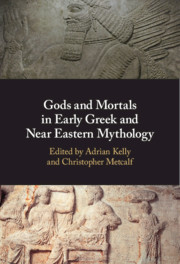Book contents
- Gods and Mortals in Early Greek and Near Eastern Mythology
- Gods and Mortals in Early Greek and Near Eastern Mythology
- Copyright page
- Contents
- Tables
- Contributors
- Acknowledgements
- Abbreviations
- Introduction
- Part I Contexts
- Chapter 1 ‘Let Those Important Primeval Deities Listen’
- Chapter 2 Siting the Gods
- Chapter 3 Politics, Cult, and Scholarship
- Chapter 4 The Scholar and the Poet
- Part II Influence
- Part III Difference
- Bibliography
- Index
Chapter 1 - ‘Let Those Important Primeval Deities Listen’
The Social Setting of the Hurro-Hittite Song of Emergence
from Part I - Contexts
Published online by Cambridge University Press: 27 March 2021
- Gods and Mortals in Early Greek and Near Eastern Mythology
- Gods and Mortals in Early Greek and Near Eastern Mythology
- Copyright page
- Contents
- Tables
- Contributors
- Acknowledgements
- Abbreviations
- Introduction
- Part I Contexts
- Chapter 1 ‘Let Those Important Primeval Deities Listen’
- Chapter 2 Siting the Gods
- Chapter 3 Politics, Cult, and Scholarship
- Chapter 4 The Scholar and the Poet
- Part II Influence
- Part III Difference
- Bibliography
- Index
Summary
This chapter revisits the case of the Hurro-Hittite poem formerly referred to (among other titles) as the Song of Kumarbi, now known as the Song of Emergence, which narrates the early history of divine kingship and the birth of the Storm God. This Hittite adaptation of an earlier, now lost but probably Hurrian composition has been recognised as the clearest evidence for the Greek reception of Near Eastern mythology, as proven by numerous aspects of both general structure and narrative detail, that are shared with Hesiod’s Theogony, especially the Succession Myth, which traces the sequence from the earliest divine kings to Zeus’s birth and rise to power. Recent interest in the rich corpus of Hittite ritual texts has yielded important information on the likely ritual contexts of the wider mythological cycle of the Song of Emergence, and possibly indeed of the Song itself: the Song's Hittite cuneiform tablet is discussed, as well as its family and scholarly background, focusing on performance of the Song in festivals at Mount Hazzi (Jebel al-Aqra), the Greek Kasios, on the Mediterranean coast. Such performance offers the most attractive historical context for the transfer of the Storm God narrative to Greece, given the likely presence of Greek traders in the vicinity.
- Type
- Chapter
- Information
- Publisher: Cambridge University PressPrint publication year: 2021
- 2
- Cited by



